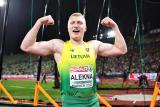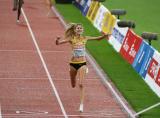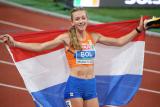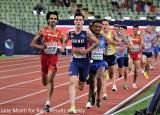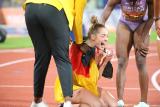Folders |
Lithuania's Mykolas Alekna Becomes Youngest European Discus Champion, Dutch Standout Femke Bol Delivers Dominant DoublePublished by
Cal standout Alekna, 19, is youngest athlete in meet history to win gold medal in any throwing event with discus championship record; Bol adds 400 hurdles victory to 400 title, Bekh-Romanchuk earns emotional triple jump triumph for Ukraine, Warholm continues recovery with repeat crown By Erik Boal, DyeStat Editor Competing at the same European Athletics Championships as fellow young stars in the sport Armand “Mondo” Duplantis of Sweden, Jakob Ingebrigtsen of Norway and Femke Bol of The Netherlands, it might be easy for Mykolas Alekna of Lithuania to be overshadowed by their success in Munich, Germany. But Alekna, representing Cal Berkeley, was front and center Friday night at the Olympic Stadium, becoming the youngest athlete to win any throwing event in meet history with his championship record in the men’s discus final. Alekna, 19, produced a fifth-round throw of 228 feet, 11 inches (69.78m) to not only prevail against reigning World Athletics Championships gold medalist Kristjan Ceh of Slovenia, but also surpass his meet-record 226-7 (69.06m) from Wednesday’s qualifying round. “I really enjoyed the competition, the crowd is amazing,” said Alekna, who secured silver July 19 at Hayward Field in Eugene, Ore., with a mark of 227-3 (69.27m). “I am really happy to win the championships. I am still young, I expect that my journey will be a long one.” Ceh, 23, could only manage a 224-foot effort (68.28m) in the fifth round Friday, with Great Britain’s Lawrence Okoye earning the first discus medal for his country by taking bronze at 220-3 (67.14m). Ceh won the World title July 19 with the best mark in meet history of 233-4 (71.13m). “Kristjan is a very strong athlete, maybe today wasn’t his day, but next year is going to be even better than this one,” Alekna said. “The rivalry between us will be tough, as well as the one with other athletes as Daniel (Stahl). I am happy to have my family in the stands, as well as the fans.” Watching his son win the gold medal Friday produced an emotional reaction in the stands from father and coach Virgilijus Alekna, who captured a silver medal in the discus in the same stadium at the 2002 European Championships in Munich. Virgilijus Alekna also earned bronze in 1998 and won gold in 2006. In a 13-month span, Mykolas Alekna has won the European U20 and World U20 gold medals, along with a World Championships silver and European senior title, in addition to producing a lifetime-best 229-1 (69.81m) effort June 30 in Sweden, the top all-time mark by a collegiate athlete at any point during the year. Bol also made history Friday by becoming the first female athlete in European Championships history to win the 400-meter hurdles and 400-meter titles in the same meet. Bol, 22, followed her 400 crown Wednesday by producing a championship record 52.67 in the 400 hurdles, becoming the first Dutch athlete to medal in the event in dominant fashion. “Winning this gold medal is a big relief. It was a great race for me. I am very surprised to achieve such a fast time. It was very hard mentally to race the 400 without hurdles,” Bol said. “I am so proud to achieve the double. I will never do the double again. Well, maybe. Never say never. I knew that if nothing strange happens, I would get this medal.” Ukraine became the first country since 2012 to celebrate a pair of athletes on the women’s 400 hurdles podium, with Viktoriya Tkachuk (54.30) securing silver and Anna Ryzhykova (54.86) capturing bronze. Norway’s Amalie Iuel, a former USC standout, was fifth in 55.32. Ukraine had another reason to celebrate Friday, with Maryna Bekh-Romanchuk rebounding from a disappointing fourth-place finish Thursday at 22-2.25 (6.76m) in the long jump final to win the triple jump title with a lifetime-best 49-3.50 (15.02m) in the fifth round. “Today it is a big evening for Ukraine with three medals for us. For all Ukrainian people, we need these positive emotions and these victories. I jumped for them,” said Bekh-Romanchuk, who was reduced to tears Thursday after fouling a sixth-round long jump that would have been good enough to secure the victory. “I am really really happy because I felt very supported by the German fans and from my family, my husband and others. Today, I won gold medal because of them. It was the best outcome for me.” Bekh-Romanchuk became the first Ukrainian female athlete to win the triple jump gold since Olha Saladukha captured three straight titles in 2010, 2012 and 2014. Finland’s Kristiina Makela produced a national record to secure silver with a second-round performance of 48-0.50 (14.64m), the first medal for her country in the event since 2002. Hanna Minenko of Israel followed her silver in 2016 with bronze Friday by achieving a third-round mark of 47-5 (14.45m). Norway’s Karsten Warholm returned to a familiar outcome in the 400 hurdles, repeating as champion by clocking 47.12, eclipsing the 1982 meet record of 47.48 established by East Germany’s Harald Schmid. “I had a very tough season with injuries, so to be here and to bounce back means the world,” said Warholm, who was slowed by a hamstring injury and placed seventh July 19 in the World Championships final. “I learned that I should have never taken anything like this for granted. Now I am going to enjoy it even more because it was so tough. I hope that I can be injury free and to train at the high level again so you could never count me out again. My friends and family are here, as well as a lot of fans from Norway. So happy to have them.” France’s Wilfried Happio captured silver in 48.56 and Turkey’s Yasmani Copello earned bronze in 48.78. Great Britain’s Laura Muir also repeated in the women’s 1,500, clocking 4:01.08 to become the first back-to-back champion since Spain’s Nuria Fernandez in 2010 and 2012. Ireland’s Ciara Mageean (4:02.56) and Poland’s Sofia Ennaoui (4:03.59) also added more European medals. Mageean followed her bronze in 2016 with silver Friday and Ennaoui added a third-place finish to her runner-up performance in 2018. Finland’s Topi Raitanen relied on a strong clearance over the final water jump to propel him to victory in the men’s 3,000 steeplechase in 8:21.80, becoming the first champion from his country since Jukka Keskisalo in 2006. Italy became the first country since France in 2016 to place two athletes on the podium, with Ahmed Abdelwahed grabbing silver in 8:22.35 and Osama Zoghlami earning bronze in 8:23.44. Great Britain became the first country since 1998 to take the top two spots in the men’s 200 final, with Zharnel Hughes capturing the nation’s first gold since Adam Gemili in 2014 by clocking 20.07. Nethaneel Mitchell-Blake, a former LSU star, produced his second straight runner-up finish in 20.17 and Filippo Tortu achieved the first medal for Italy since 1978 with his bronze in 20.27. Ramil Guliyev of Turkey, the defending champion, pulled up with an injury less than 50 meters into the race and didn’t finish. After being edged for the title by five-thousandths of a second Tuesday in the 100-meter final, Switzerland’s Mujinga Kambundji left no doubt in the 200 championship Friday, winning in 22.32 to capture the first medal for her country in the event in meet history. Two-time reigning champion Dina Asher-Smith of Great Britain secured silver in 22.43 and Ida Karstoft of Denmark also earned the first medal for her country by grabbing bronze in 22.72. Oregon’s Shana Grebo, representing France, was sixth in 23.06. More news |




